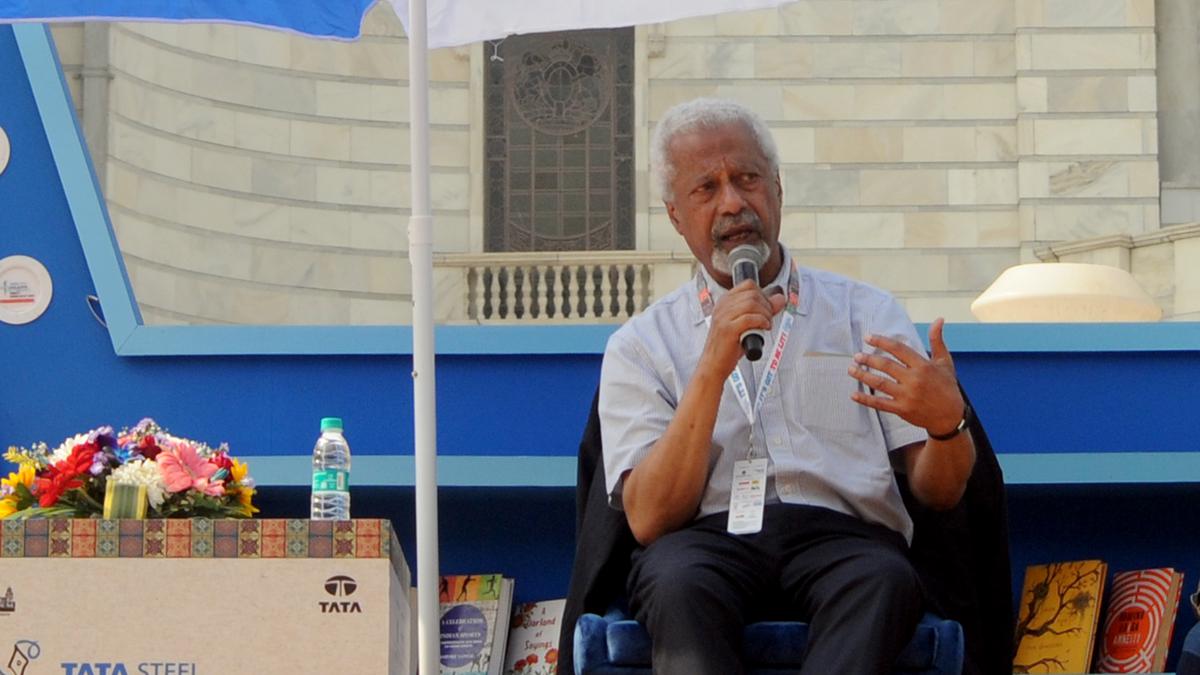
Growing up in Zanzibar, Abdulrazak Gurnah felt the lack of bookstores and libraries and he ended up reading and re-reading his school textbooks. This “scarcity of books” contributed to a kind of hunger for reading material, and one of the interesting things of moving to the U.K. when he was 18 was the realisation that with so much available to read, he could devote himself to a life in literature.
Opening the Tata Steel Kolkata Literary Meet on Tuesday (January 23-27), Mr. Gurnah, who won the Nobel Prize in Literature in 2021, spoke about his writing life, touching on his 10 novels, with “the theme of the refugee’s disruption” running through them, in a conversation with writer and columnist Nilanjana S. Roy.
The audience was in for a treat when the Nobel laureate announced that a new novel, A Long Road, is ready and will be published early next year.
“The discovery of so much reading gave me a kind of purpose [in England in the 1960s.] I became a student of literature against the wishes of everyone,” Mr. Gurnah, Emeritus Professor in the University of Kent, said. His first novel, Memory of Departure, was published in 1987 after over a decade of it being written. “It took a long time to be published but in that period I was constantly working, constantly learning how to write.”
The 75-year-old Mr. Gurnah, having been forced to leave Tanzania after the revolution in 1963, followed by riots which targeted the community he belonged to, has always been telling stories about exile, displacement, migration. It is a difficult experience to leave country, family, everything and be a complete stranger in a place with an associated history of hostilities. The characters in his books are often seen trying to work things out in a new place, as Mr. Gurnah also explores what is it that they have left behind. The refugee or migrant, Mr. Gurnah said, has to come to terms with where he has arrived, and with where he has come from.
While awarding him the Nobel Prize in Literature, the Swedish Academy spoke about his “uncompromising and compassionate penetration of the effects of colonialism and the fate of the refugee in the gulf between cultures and continents.” Mr. Gurnah’s best-known novel is Paradise (1994) which tells the story of 12-year-old Yusuf uprooted from his village and “pawned” to an uncle to pay off his father’s debts. The coming-of-age story is pitted against an Africa struggling with colonialism and its aftermath. In another novel, Afterlives, Mr. Gurnah traces the lives of Ilyas and Hamza as the Germans, British, French, and Belgians carve up Africa, leaving so much unresolved that the continent is still reeling from the repercussions. “To say colonialism is over is to not understand it,” he said. Pointing at the situation in Africa and West Asia, he said many of the conflicts can be traced to imperial decisions.
Asked about England’s changing policy towards migrants, Mr. Gurnah said that there is “profound hostility in how people are received,” and a huge desire to keep people out rather than take them in.

COMMents
SHARE